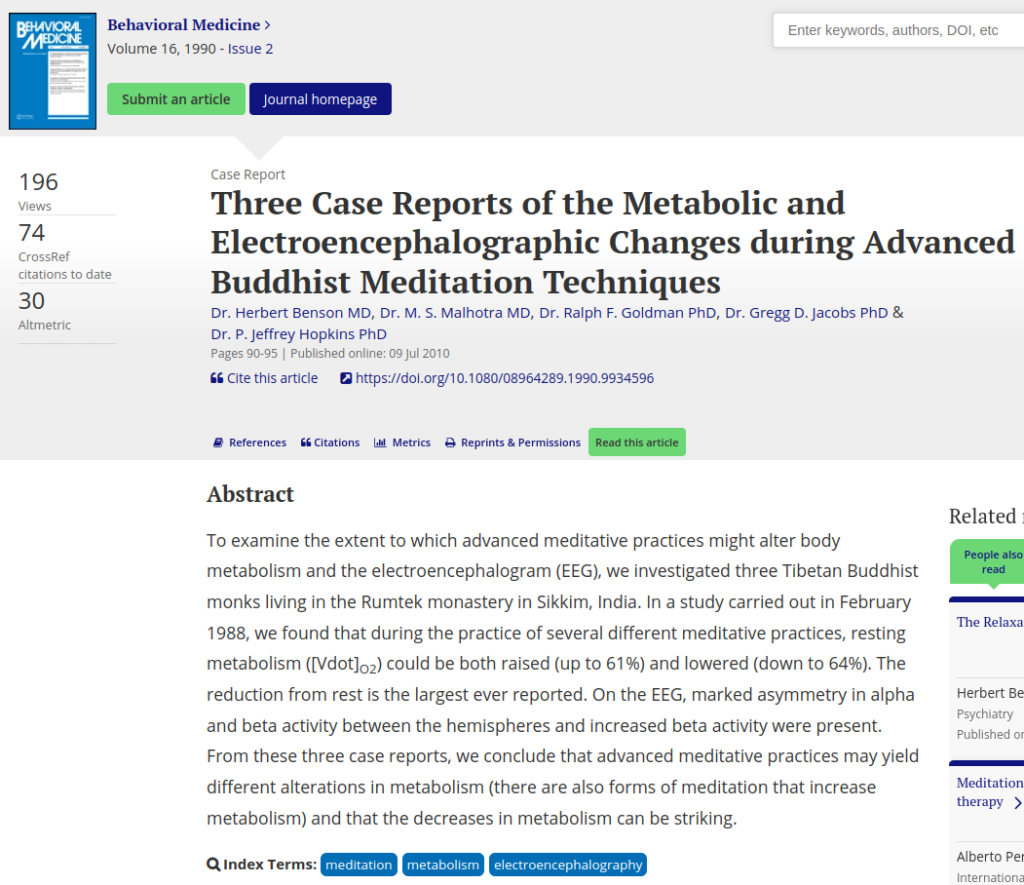To examine the extent to which advanced meditative practices might alter body metabolism and the electroencephalogram (EEG), we investigated three Tibetan Buddhist monks living in the Rumtek monastery in Sikkim, India. In a study carried out in February 1988, we found that during the practice of several different meditative practices, resting metabolism ([Vdot]O2) could be both raised (up to 61%) and lowered (down to 64%). The reduction from rest is the largest ever reported. On the EEG, marked asymmetry in alpha and beta activity between the hemispheres and increased beta activity were present. From these three case reports, we conclude that advanced meditative practices may yield different alterations in metabolism (there are also forms of meditation that increase metabolism) and that the decreases in metabolism can be striking.
Three Case Reports of the Metabolic and Electroencephalographic Changes during Advanced Buddhist Meditation Techniques
Publication
Behavioral Medicine
Volume 16, Issue 2
Abstract
Related Listings
Journal
Behavioral Medicine
Over the last 20 years, medical researchers from a variety of disciplines, including behavioral medicine, neuro-immunology, neuroendocrinology, social medicine, and psychiatry, have converged in an effort to produce greater understanding and acceptance of the effects of psychological factors on physical health. Many in the medical profession have remained somewhat skeptical, claiming that psychological components of healing are largely "folklore", unsubstantiated by hard evidence. The […]
Journal
Journal of Cardiopulmonary Rehabilitation
We previously reported reduced blood pressure, psychological symptoms, and other cardiac risk factors in hypertensive patients who participated in a nonpharmacologic, outpatient behavioral program. The present study is a 3 to 5 year follow-up of 59 (60%) of the same patients (who served as their own controls) to assess continued efficacy of the program. At entry into the study, patients had hypertension for a median of 6 years. Therefore, it is unlikely that placebo effect could expla […]
Journal
PLOS ONE
The relaxation response (RR) is the counterpart of the stress response. Millennia-old practices evoking the RR include meditation, yoga and repetitive prayer. Although RR elicitation is an effective therapeutic intervention that counteracts the adverse clinical effects of stress in disorders including hypertension, anxiety, insomnia and aging, the underlying molecular mechanisms that explain these clinical benefits remain undetermined. To assess rapid time-dependent (temporal) genomic […]

